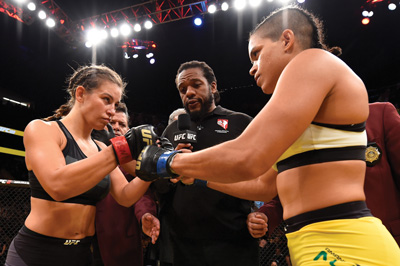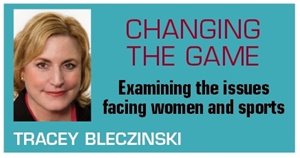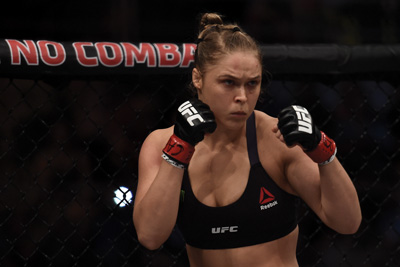This may surprise you, but the most remarkable thing about Ronda Rousey isn’t her show-stopping performances in the octagon, her crossover appeal or her acting skills. It’s that she and the other female athletes in the UFC represent something most thought we would never see: gender equity in professional sports.
I have been around sports my whole life, but I’ve only witnessed gender equality in sports twice — here at the UFC and as a high school athlete in Roeland Park, Kan. At Bishop Miege High School, I was part of a dominant women’s championship basketball team that equally shared the gym space, local fan base and spotlight with our male counterparts. The overall support we received during this time was one of the contributing factors to our success. Unfortunately, it took decades before I witnessed this level of gender equity in sports again.
I’ve worked at great places throughout my career in sports. When I started at the NFL, women’s licensed products were a scarce afterthought. We started small, but we had no doubt that female NFL fans not only wanted these products, but were eager to represent and show their pride for their favorite NFL team. We were right. We proved our case by launching the NFL Women’s Apparel: Fit For You platform, one that resulted in a major sea change in the business.
 |
The Miesha Tate-Amanda Nunes bout headlined UFC 200. Ronda Rousey (below) convinced the UFC that a women’s division would grow the sport.
Photos by: GETTY IMAGES (2)
|
Now, women’s licensed products are a core part of the sports licensing landscape and licensees are dedicated to developing entire product lines for women. Gender equity in licensed products is big business across the sports landscape and it continues to see significant growth.
The UFC is the only professional sports organization in the world where male and female athletes compete on equal ground in all aspects. All of our athletes operate on the same entry-level pay scale and
receive equal athlete outfitting policy compensation per recorded number of bouts. They also compete with the same equipment in an equal-sized octagon for the same number of rounds during both regular and championship bouts. Our athletes are also held to identical testing standards with regard to our anti-doping policy and weight management guidelines.
To be transparent, in January 2011, UFC President Dana White said that women would never compete in UFC. However, once he saw Ronda’s ability and overall talent, she convinced him that adding women’s divisions would grow the sport of mixed martial arts. She was right.
This is significant because now there is a benchmark in the marketplace for those who seek gender equity in professional sports.
UFC athletes are being recognized globally as influencers, with massive social media followings and significant cultural impact. With more than 21 million followers across Facebook, Twitter and Instagram, Ronda is now one of the most followed professional athletes in the world. Ronda’s overall MVPIndex rank (as of June 20) across platforms, calculated using reach, engagement and conversations, places her as the second-most influential female athlete in professional sports, which is truly amazing.
In fact, Ronda is the second-highest-paid athlete in the entire organization and her licensed products are consistently top sellers across all categories.
The UFC’s most-attended event, UFC 193, was headlined by two women championship matchups in Melbourne, Australia, last November. More than 56,000 UFC fans packed Etihad Stadium, and our pay-per-view audience was one of the largest in UFC history, which is extraordinary for a global brand that established women’s divisions fewer than five years ago.
The positive outcome of the UFC’s gender blindness is that our sport has been able to grow on a global scale and provide new role models for female athletes.
UFC 200, our historic event which culminated the fifth annual UFC International Fight Week earlier this month, was a perfect example. The landmark event was the biggest in our history, and it was headlined by UFC bantamweight champion Miesha Tate facing fourth-ranked contender Amanda Nunes with the title on the line. This wasn’t just another bout on the prelims, this was the main event of the most anticipated fight card in UFC history.
Our athletes and core products are viewed the same. No one ever distinguishes between male and female UFC athletes. They train together. They spar together. Most importantly, they are equals in both the gym and the business.
As great as this is, there is more room within the industry for progress, to even the playing field for female athletes across all professional sports.
Why does this work at the UFC?
Bottom line, the topic of gender never enters the conversation. They’re not men, not women, just our athletes. It’s not a factor, nor a consideration, as talent and audience appeal drive our business.
Equity is just a given.
Tracey Bleczinski is senior vice president of global consumer products for the UFC.






